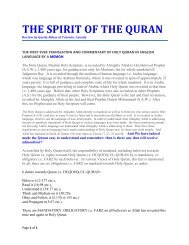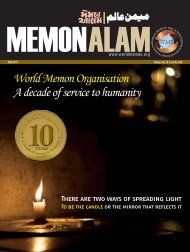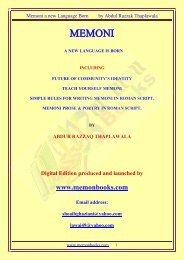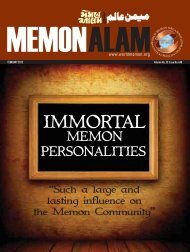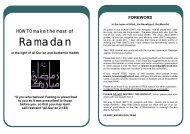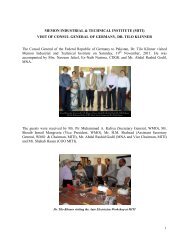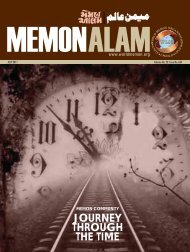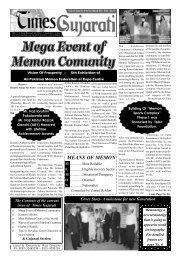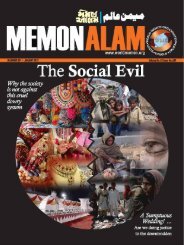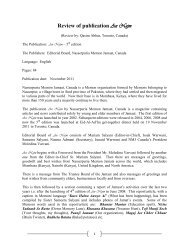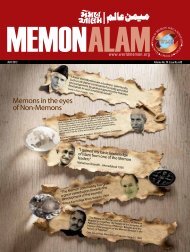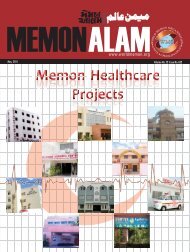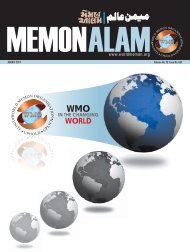WMO President's - Visit to Pakistan and India - World Memon ...
WMO President's - Visit to Pakistan and India - World Memon ...
WMO President's - Visit to Pakistan and India - World Memon ...
You also want an ePaper? Increase the reach of your titles
YUMPU automatically turns print PDFs into web optimized ePapers that Google loves.
TIPS<br />
Foundations of<br />
Child development<br />
Educa<strong>to</strong>rs <strong>and</strong> psychologists are constantly<br />
telling us about the importance<br />
of play in education. Countries,<br />
which <strong>to</strong>ok these researchers seriously<br />
<strong>and</strong> tried out their methods in classroom<br />
settings, have in fact obtained the claimed<br />
results. This led <strong>to</strong> the coining of the phrase<br />
“developing skills through playing games.”<br />
“Play” in the words of famous educationist<br />
Froebel “is the purest, most spiritual activity<br />
of man. It gives joy, freedom, contentment,<br />
inner <strong>and</strong> outer rest, peace with the world.<br />
Play is the highest phase of child development.”<br />
Others regard play as an adaptive behavior<br />
that facilitates thinking in children. By<br />
engaging in different types of play, children<br />
practice <strong>and</strong> consolidate skills, such as eye<br />
<strong>and</strong> h<strong>and</strong> coordination <strong>and</strong> sensory mo<strong>to</strong>r<br />
skills. Each type of play is essential for<br />
cognitive development at different stages<br />
of childhood. Playing activities help the<br />
children learn how <strong>to</strong> manipulate objects<br />
<strong>and</strong> develop self-esteem.<br />
Famous psychologist Freud <strong>to</strong>o pointed<br />
out that play makes a critical contribution <strong>to</strong><br />
children’s growth <strong>and</strong> relates <strong>to</strong> their physical<br />
<strong>and</strong> mental representations. It makes the<br />
children feel free <strong>to</strong> explore different behavioral<br />
combinations as well as enjoy greater<br />
flexibility <strong>and</strong> creativity. Furthermore, play<br />
promotes children’s motivation, curiosity,<br />
<strong>and</strong> invention skills <strong>and</strong> helps in their gaining<br />
more confidence.<br />
There is a huge variety of <strong>to</strong>ys that the<br />
children play with both in their homes<br />
<strong>and</strong> early childhood classrooms of which<br />
wooden or plastic blocks may be one of the<br />
most popular objects. The children use these<br />
different size blocks in a variety of ways<br />
<strong>and</strong> according <strong>to</strong> their creative impulses <strong>and</strong><br />
imagination<br />
Block play helps the little ones gain basic<br />
knowledge about language, science <strong>and</strong><br />
mathematics. Besides recognizing names,<br />
labels <strong>and</strong> shapes, it teaches them about<br />
sentence structures, linguistic rules, grammar<br />
<strong>and</strong> vocabulary. Communicating <strong>and</strong><br />
interacting with play mates <strong>to</strong>o brings up<br />
opportunities <strong>to</strong> express ideas through the<br />
use of language. These language experiences<br />
are seen as indications of the early<br />
emergence of reading <strong>and</strong> writing abilities.<br />
Block play also provides a foundation<br />
for the study of science. Children learn the<br />
properties of different kinds of blocks that<br />
may vary in shapes, sizes, weights <strong>and</strong> material.<br />
Knowing how <strong>to</strong> make use of a given<br />
space <strong>to</strong> build a structure on it is another<br />
important concept of science derived from<br />
block play. In addition, the stacking <strong>and</strong><br />
piling up of blocks teaches children about<br />
balance <strong>and</strong> stability. It is through trial<br />
<strong>and</strong> error that they discover the basics of<br />
construction such as stacking the blocks on<br />
a solid foundation.<br />
Playing with blocks also helps develop<br />
mathematical skills in young learners.<br />
It gives them an idea of mathematical<br />
concepts such as length, height, width <strong>and</strong><br />
depth. Then counting the blocks helps the<br />
children know numbers <strong>and</strong> get an idea of<br />
quantity.<br />
With the development of imagination<br />
<strong>and</strong> creativity comes the building of houses,<br />
boats, shops <strong>and</strong> trains with the blocks.<br />
Playing <strong>to</strong>gether the children communicate<br />
<strong>and</strong> negotiate with playmates while using<br />
problem solving strategies. In addition,<br />
they learn <strong>to</strong> see things from the perspective<br />
of others in order <strong>to</strong> work <strong>to</strong>gether as a<br />
team. In doing so they take turns or share<br />
the blocks while helping or giving suggestions<br />
on how <strong>to</strong> improve each other’s little<br />
projects. Each person involved feels a sense<br />
of responsibility by contributing <strong>to</strong> the<br />
team.<br />
Playing with blocks requires physical manipulation<br />
offering children with opportunities<br />
<strong>to</strong> practice their fine <strong>and</strong> gross mo<strong>to</strong>r<br />
coordination. For instance, piling one block<br />
on <strong>to</strong>p of another <strong>to</strong> build a <strong>to</strong>wer requires<br />
of them <strong>to</strong> place the blocks in the right position<br />
<strong>to</strong> keep the <strong>to</strong>wer from <strong>to</strong>ppling over.<br />
The exercise proves beneficial in improving<br />
eye-h<strong>and</strong> coordination.<br />
Playing with blocks, in a nutshell, provides<br />
children with opportunities <strong>to</strong> discover<br />
<strong>and</strong> experience the different dimensions of<br />
knowledge. Learning from play is the one<br />
of the foundations of education. Children<br />
learn <strong>and</strong> develop through play, whether<br />
at school, with peers or at home with their<br />
siblings or parents.<br />
MEMON ALAM APRIL 2011 41



